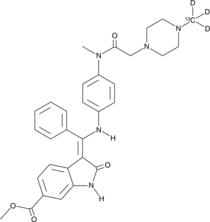Territorial Availability: Available through Bertin Technologies only in France
- Synonyms
- methyl (Z)-3-(((4-(N-methyl-2-(4-(methyl-13C-d3)piperazin-1-yl)acetamido)phenyl)amino)(phenyl)methylene)-2-oxoindoline-6-carboxylate
- Correlated keywords
- 1624587-84-3 deuterated deuterium BIBF1120 GCMS LCMS VEGFR FGFR 1 2 3 4 PDGFR ? alpha FLT 3 PDGFR-? beta Fa Du Caki1
- Product Overview:
BIBF 1120-13C-d3 is intended for use as an internal standard for the quantification of BIBF 1120 (Item Nos. 11022 | 31082) by GC- or LC-MS. BIBF 1120 is an inhibitor of the receptor tyrosine kinases VEGFR, FGFR, and PDGFR (IC50s = 13-34, 37-610, 59, and 65 nM for VEGFR1-3, FGFR1-4, PDGFR?, and PDGFR?, respectively).{20204} It is selective for VEGFR, FGFR, and PDGFR over a panel of 33 kinases but does inhibit FLT3, LCK, LYN, and Src (IC50s = 16-156 nM). BIBF 1120 inhibits growth factor-dependent proliferation of human umbilical vascular endothelial cells (HUVECs), human microvascular skin endothelial cells (HSMECs), human umbilical artery smooth muscle cells (HUASMCs), and bovine retinal pericytes (BRPs; EC50s = 7-290 nM). In vivo, BIBF 1120 (100 mg/kg) reduces tumor microvessel density and the number of PDGFR?-expressing perivascular cells in a FaDu head and neck small cell carcinoma mouse xenograft model. It also inhibits tumor growth in a Caki-1 renal cancer mouse xenograft model. Formulations containing BIBF 1120 have been used in the treatment of idiopathic pulmonary fibrosis and non-small cell lung cancer (NSCLC).
Cayman Chemical’s mission is to help make research possible by supplying scientists worldwide with the basic research tools necessary for advancing human and animal health. Our utmost commitment to healthcare researchers is to offer the highest quality products with an affordable pricing policy.
Our scientists are experts in the synthesis, purification, and characterization of biochemicals ranging from small drug-like heterocycles to complex biolipids, fatty acids, and many others. We are also highly skilled in all aspects of assay and antibody development, protein expression, crystallization, and structure determination.
Over the past thirty years, Cayman developed a deep knowledge base in lipid biochemistry, including research involving the arachidonic acid cascade, inositol phosphates, and cannabinoids. This knowledge enabled the production of reagents of exceptional quality for cancer, oxidative injury, epigenetics, neuroscience, inflammation, metabolism, and many additional lines of research.
Our organic and analytical chemists specialize in the rapid development of manufacturing processes and analytical methods to carry out clinical and commercial GMP-API production. Pre-clinical drug discovery efforts are currently underway in the areas of bone restoration and repair, muscular dystrophy, oncology, and inflammation. A separate group of Ph.D.-level scientists are dedicated to offering Hit-to-Lead Discovery and Profiling Services for epigenetic targets. Our knowledgeable chemists can be contracted to perform complete sample analysis for analytes measured by the majority of our assays. We also offer a wide range of analytical services using LC-MS/MS, HPLC, GC, and many other techniques.
Accreditations
ISO/IEC 17025:2005
ISO Guide 34:2009
Cayman is a leader in the field of emerging drugs of abuse, providing high-purity Schedule I-V Controlled Substances to federally-licensed laboratories and qualified academic research institutions for forensic analyses. We are certified by ACLASS Accreditation Services with dual accreditation to ISO/IEC 17025:2005 and ISO Guide 34:2009.





